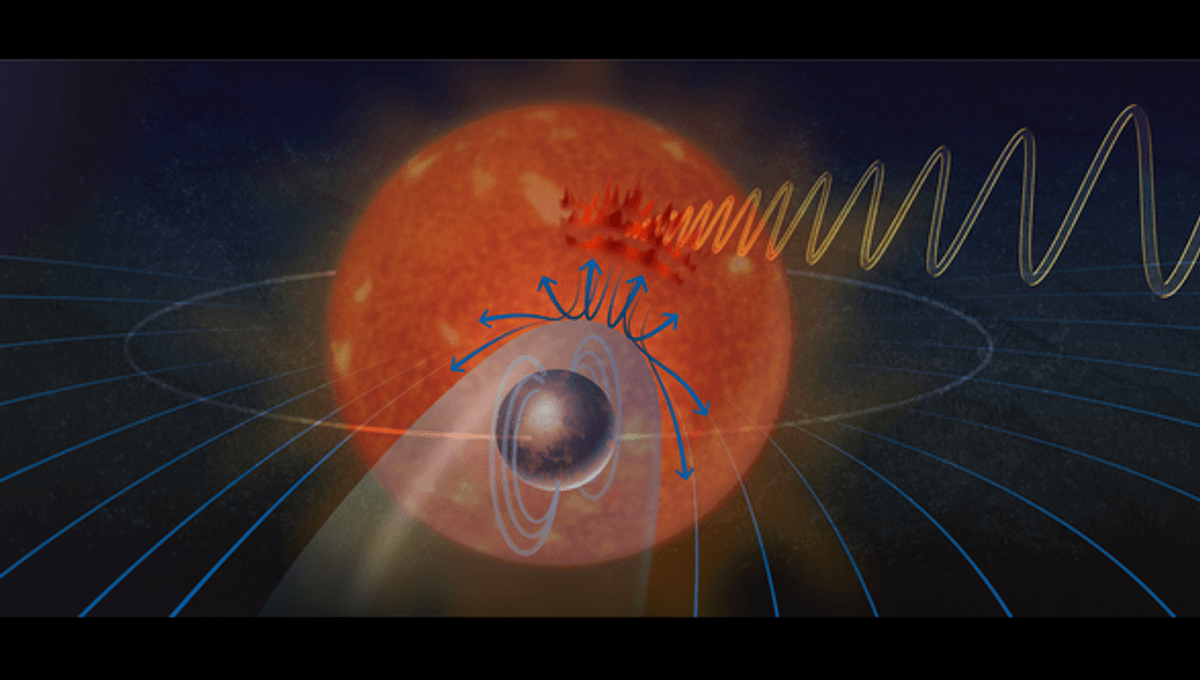
A repeating signal from the star YZ Ceti is thought to indicate that its innermost planet has a strong magnetic field. If so, this would be the first time we have detected a strong field around a rocky planet, Earth aside, rather than a Neptune-sized gas planet.
Of all the things that make the Earth a good place to grow a civilization, its strong magnetic field is among the most important. The auroras and capacity to direct a compass are nice, but what really matters is the way it shields the atmosphere from the solar wind. Just ask Mars. Venus and Mercury are similarly lacking, making planetary scientists wonder if magnetic fields like our own are actually very rare for rocky planets, which would be a major blow to the chances of finding life.
Consequently, the discovery of another rocky planet with a powerful magnetic field would be very reassuring, Dr Sebasian Pineda of the University of Colorado and Dr Jackie Villadsen of Bucknell University think they have done this, although, they admit in their new paper there is still room for some doubt.
The authors targeted YZ Ceti b because it is definitely rocky and orbits very close to a slowly rotating star. That raises the chance the two objects’ magnetic fields will interfere with each other and reduces the prospects for confounding signals.
Using the Karl G. Jansky Very Large Array, the pair picked up regular 3 GHz radio bursts that they think come from interactions between the magnetic fields of the planet and star. “I’m seeing this thing that no one has seen happen before,” said Villadsen in a statement. “We saw the initial burst and it looked beautiful,” added Pineda. “When we saw it again, it was very indicative that, OK, maybe we really have something here.” Crucially, the bursts occur when the planet is in a specific phase of its orbit.
The authors think the signal arises from YZ Ceti b’s interactions with charged particles around the star. “If the planet has a magnetic field and it plows through enough star stuff, it will cause the star to emit bright radio waves,” Villadsen said. We see something similar between Io and Jupiter on a smaller scale.
YZ Ceti is a red dwarf around 12 light years away with three known planets all in very short orbits. YZ Ceti b has a “year” lasting just two Earth days, and a mass at least 70 percent of Earth’s.
A powerful planetary magnetic field would disrupt plasma in YZ Ceti’s atmosphere, causing it to interact with the star’s own field and produce radio waves. The authors think this is what they have detected.
“We’re actually seeing the aurora on the star — that’s what this radio emission is,” Pineda explained. “There should also be aurora on the planet if it has its own atmosphere.”
Nevertheless, Pineda and Villadsen acknowledge something else might be causing the signal they picked up. To confirm their explanation they’ll need to demonstrate that stars without such close-in planets don’t produce similar radio bursts,
Even with a star as cool as YZ Ceti, no planet on a two-day orbit will be habitable. However, the discovery makes it more likely the Earth’s field is not an outlier, even though we don’t really understand why our planet has it and Venus does not.
The discovery is published in Nature Astronomy.
Source Link: Earth-like Planet’s Magnetic Field Suspected Of Causing Auroras On A Star